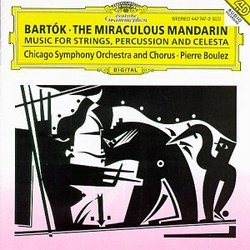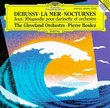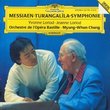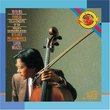| All Artists: Bela Bartok, Pierre Boulez, Chicago Symphony Orchestra Title: B�la Bart�k: The Miraculous Mandarin / Music for Strings, Percussion & Celesta - Chicago Symphony Orchestra & Chorus / Pierre Boulez Members Wishing: 1 Total Copies: 0 Label: Deutsche Grammophon Release Date: 4/9/1996 Genre: Classical Styles: Ballets & Dances, Ballets, Historical Periods, Modern, 20th, & 21st Century Number of Discs: 1 SwapaCD Credits: 1 UPC: 028944774726 |
Search - Bela Bartok, Pierre Boulez, Chicago Symphony Orchestra :: B�la Bart�k: The Miraculous Mandarin / Music for Strings, Percussion & Celesta - Chicago Symphony Orchestra & Chorus / Pierre Boulez
 | Bela Bartok, Pierre Boulez, Chicago Symphony Orchestra B�la Bart�k: The Miraculous Mandarin / Music for Strings, Percussion & Celesta - Chicago Symphony Orchestra & Chorus / Pierre Boulez Genre: Classical
The Miraculous Mandarin is, along with Stravinsky's The Rite of Spring, one of the great expressions of musical savagery, and here the composer illustrates the "urban jungle." The music opens with sounds of traffic and ... more » |
Larger Image |
CD DetailsSynopsis
Amazon.com essential recording The Miraculous Mandarin is, along with Stravinsky's The Rite of Spring, one of the great expressions of musical savagery, and here the composer illustrates the "urban jungle." The music opens with sounds of traffic and commotion, and it's an expressionist nightmare from that point on. Three men mug a woman and force her to lure men into their den to be robbed in turn. One of them turns out to be a wealthy Chinese man whose passion for the woman is so strong that, despite being stabbed, suffocated, and strung up on a lamp cord, he will not die until the woman permits him to embrace her. Then his wounds open and he bleeds to death. Quite a story, and the music, as well as this performance, suits it perfectly. Have fun. --David Hurwitz Similar CDs
Similarly Requested CDs |
CD ReviewsThe Miraculous Mandarin Jason Amsden | Boston, MA United States | 01/02/2000 (4 out of 5 stars) "A live recording with Istvan Kertesz and the Chicago Symphony introduced me to The Miraculous Mandarin by Bela Bartok. Unfortunately, that recording was only the suite and not the whole ballet. I recently received this recording of the complete ballet with Pierre Boulez and the CSO as a gift. The two recordings are extremely different. Listening to the Boulez version, I get the impression that I am hearing the story second hand; It is like Boulez is telling me a fairy tale. Kertesz on the other hand gives me the feeling that I am living the story. I think that it is close to the most fantastic recording of anything that I have ever heard. I like listening to both versions very much. Which one I listen to depends on my mood. In terms of sound and recordng quality, I have a minor problem with this recording. I do not find the recording incredibly clear. It sort of sounds like looking through a pair of glasses with some smudged greesy fingerprints on them. This is a minor point though and it does not take very much away from the performance.If you are interested in the Kertesz recording, it is available on a 12 CD set from the CSO store." ONE OF BARTOK'S MASTERPIECES. Lord Chimp | Monkey World | 05/27/2004 (5 out of 5 stars) "I think I'm kind of an idiot about classical music, so I can only make basic comments here. Music for Percussion, Strings, and Celesta is one of Bartok's greatest works, and as such is one of the greatest works in all of Western music. Despite the ostensible eminence the celesta is given in the title of the piece, the dominant keyboard instrument is piano, which is part of the percussion ensemble that serves as the anchor for two string sections. The piece is an amazing exploration of opposites, especially its use of chromatic and diatonic elements. The first movement is a chromatic fugue for strings, and Bartok's use of changing meters gives it a watery effect. From the first movement you can already tell it is one of Bartok's best compositions, simply because every note is so exceptionally placed and the flow is so natural. The second movement is an exhilarating allegro, a tight mesh of melodic themes manipulated with rhythmic and metric variation. The third movement is intensely chromatic "night music" with obscure tonality and fragmentary melodies. Best of all, the fourth movement, where diatonic considerations come to the fore and it is the most varied in rhythm, melody, and pitch, but still structurally sublime. Throughout the piece, the key subjects are changed into new subjects, which undergo their own changes, and eventually morphing back into previous themes. This is done with such uncanny perfection that the music really feels like it takes you places. I know that sounds cheesy. I won't discuss _The Miraculous Mandarin_, though it is very good as well.Get this if you want to hear a divine performance of one of the musical universe's greatest treasures. (Sorry for the CAPS above, I know it's annoying.)" Darkly Beautiful Joseph Kimsey | Pac NW | 04/05/2003 (5 out of 5 stars) "In response to one of the reviews posted here, I must disagree with the statement that Boulez's conducting makes these works "cynical, pedantic and profoundly ugly." But then, I've never heard the Leonard Bernstein version of The Miraculous Mandarin, so he may have a point (please note sarcasm). These pieces are conducted in a very unromantic style that suits these works well in particular, and Bartok's entire output in general. There's nothing conventionally "pretty" at all about these works. But they are both truly beautiful, in a profoundly dark sense. The Miraculous Mandarin depicts the violence and the desperation of the story it is based upon, while the Music for Strings, Percussion, and Celesta is possibly the greatest orchestral work of the twentieth-century. Vivaldi this is not."
|

 Track Listings (15) - Disc #1
Track Listings (15) - Disc #1









